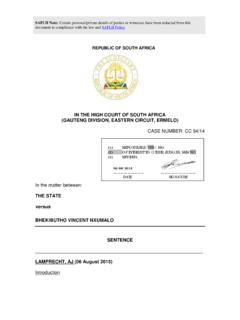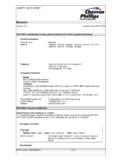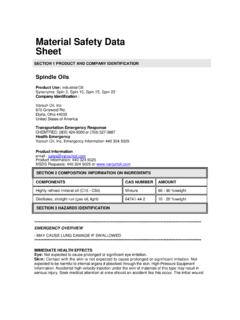Transcription of THE HIGH COURT OF SOUTH AFRICA GAUTENG LOCAL …
1 THE HIGH COURT OF SOUTH AFRICA GAUTENG LOCAL DIVISION, JOHANNESBURG CASE NO: 049/2016 In the matter between: THE STATE And WILLIAM JABULANE MATJEKE Summary Sentence Murder and Robbery with aggravating circumstances . Sec 51 (1) and 51 (2) of Act 105 of 1997 applicable Premeditated murder Substantial and compelling circumstances Role of alcohol whether serving as mitigating or aggravating for sentence. (1) REPORTABLE: YES (2) OF INTEREST TO OTHER JUDGES: YES (3) REVISED..07/06 .. DATE SIGNATURE 2 The accused was convicted of murder and robbery with aggravating circumstances . Evidence indicated that he had consumed alcohol before and during the commission of the crimes resulting in him killing the wrong person to the one he wanted to kill in revenge.
2 Sec 51 (1) of Act 105 of 1997 is applicable in that murder was premeditated. The deceased, a colleague to the accused with whom they had good working relations, was mistaken for a gunman who had fired shots at the accused moments earlier. Alcohol concentration in his blood was gram per 100 ml. Held, that, substantial and compelling circumstances can be found in traditional mitigating factors. If the imposition of prescribed sentences is disproportionate to crime, criminal and legitimate needs of society; that on its own constitutes substantial and compelling circumstance justifying a lesser sentence than life imprisonment. Held, further, that alcohol consumption can in certain circumstances serve as mitigating circumstances .
3 A cumulative sentence of 20 years imprisonment was imposed. _____ SENTENCE _____ RATSHIBVUMO AJ: 1. Mr. Matjeke (the accused), was convicted by this COURT of the crimes of murder and robbery with aggravating circumstances . The COURT will now proceed to hand down the sentence. It is the COURT s unpleasant and difficult task to impose the sentence on the accused, but it has to be done. 2. The imposition of sentence is not a mechanical process in which predetermined sentences are imposed for specific crimes. It is a nuanced 3 process in which the COURT is required to weigh and balance a variety of factors to determine a measure of the moral, as opposed to legal, blameworthiness of an accused.
4 That measure is achieved by a consideration, and an appropriate balancing, of what the well-known case of S v Zinn1 described as a triad consisting of the crime, the offender and the interests of society . 3. A sentencing COURT does not always have an untrammelled discretion to determine sentence a clean slate on which to work. In certain cases and this applies to all the charges the accused was convicted of prescribed sentences are provided for by the Criminal Law Amendment Act 105 of 1997 (the so called Minimum Sentences Act ). Section 51 of Minimum Sentences Act provides, 1) Notwithstanding any other law, but subject to subsections (3) and (6), a regional COURT or a High COURT shall sentence a person it has convicted of an offence referred to in Part I of Schedule 2 to imprisonment for life.
5 2) Notwithstanding any other law but subject to subsections (3) and (6), a Regional COURT or a High COURT shall sentence a person who has been convicted of an offence referred to in- (a) Part II of Schedule 2, in the case of- (i) a first offender, to imprisonment for a period not less than 15 years. Murder is listed in Part I of Schedule 2 when (a) it is planned or premeditated and in casu, the COURT found premeditation on the part of the accused. Robbery with aggravating circumstances is equally listed in Part II of Schedule 2. 1 1969 (2) SA 537 (A), at 540G-H 4 4. In line with the Zinn decision, in determining an appropriate sentence, the COURT has taken into consideration the accused s personal circumstances , interests of the society, the crime and the circumstances surrounding its commission.
6 Although these interests may be conflicting in nature, it is expected of this COURT to keep a fine balance between them, and it must endeavour not to over or to under emphasize anyone of them. The COURT is also called upon to exercise a measure of mercy when imposing a sentence S v Rabie2. 5. The offender: Personal circumstances : The accused is an adult male aged 33 years old. He is a father of two kids aged, 11 and 6 years old who are all school-going. He is a first offender. He resides with his fianc e, Mary who was in his company when the crimes he was convicted of were committed. She is currently pregnant and is due to deliver by today. This could mean the day he is sentenced; the accused also became a father.
7 What a bitter-sweet moment. 6. The society interests: The interests of the community overlap to an extent with what has been mentioned above. The society deserves to live in a better world than the one forced on it by the likes of the accused. Had the accused as a taxi driver treated members of the public with the respect they deserve at the shooting scene, this would not have happened. Those people had a right to choose not to be passengers in the accused s motor vehicle especially seeing that it would have been overloaded. The accused chose a confrontational way to force them in. That triggered the shooting by one of them which set the wheel rolling to this end. 2 1975 (4) SA 855 (AD).
8 5 7. The crime: The crimes the accused was convicted of are very serious. The way the murder was committed suggests that the accused does not value the sanctity of life. The deceased died a painful and unnecessary death. We do not know for sure if the deceased was already dead by the time the accused decided to drive away from the scene. He could have taken efforts to search for a person he had knocked down, seeing, no matter how much guilt he apportioned to him, it was a human being; but he chose not to. Had he done so, as statutorily obliged, he would have noticed that he meted out his revenge on a wrong person. He would also have had enough opportunity to observe if there was still any life in him so as to seek medical help.
9 8. The accused also had enough time to repent from his plans to avenge and kill, but he chose not to, even as his fianc e and other occupants of the motor vehicle tried to persuade him not to. Had the accused been caring enough and concerned over people injured in his motor vehicle, it was appropriate for him to seek medical help than expose them to further risk when he took them back into the battle. For these reasons, the decision to drive back was irrational. 9. The COURT cannot overlook the role of alcohol consumption in this regard. There is enough evidence to suggest that the accused was not sober as testified by W/O Mabotja. There is however no evidence suggesting that such consumption diminished the accused s criminal capacity.
10 It however remains anybody s guess as to whether, had he been sober he would have allowed the hikers a right not to board his motor vehicle, whether he would have listened to his fianc e s plea amongst others, not to go back, and whether he would have recognised the deceased as his colleague who was a passenger in his motor vehicle. 6 10. While alcohol consumption can serve as aggravating circumstances in certain cases,3 it certainly serves as a mitigating factor in circumstances such as of this The COURT cannot overlook that the accused s motor vehicle was shot at, albeit at his initiatives. He had passengers who were injured in his motor vehicle and in a moment, decided it was time to avenge the shooting.

















